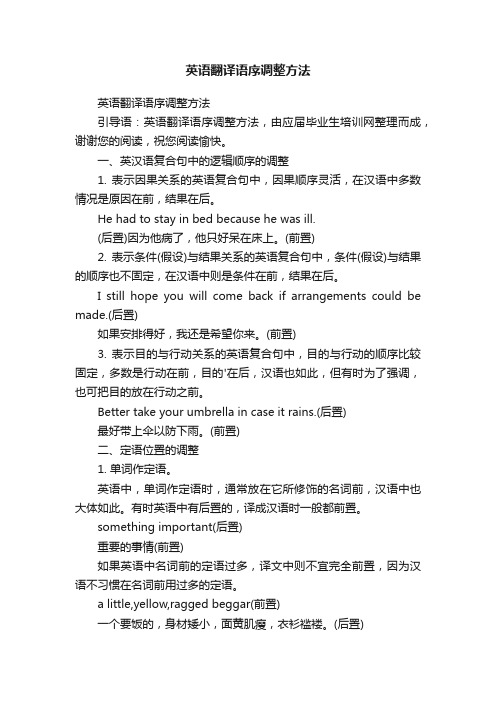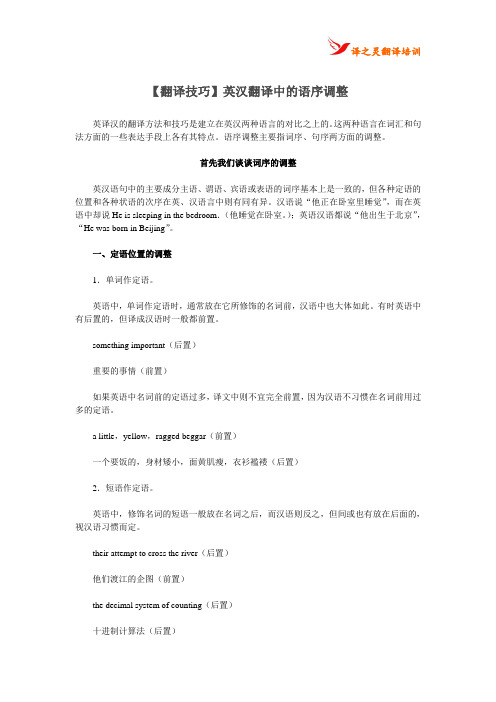汉英翻译方法 句序的调整和否定句翻译
英汉互译中语序的调整

汉语的连动句或称施事句的英译首先要从汉语各动 词的时间或事理排列顺序中看清它们之间的关系和 性质,进而确定一个或几个S-V主干,以便英语断 句,而后调动英语的各种连接手段把汉语中采用的 动词转换成各类英语的短语或从句,打破汉语句子 的时间或事理顺序,适当地挂连在各个主干上。比 如:
6)紫鹃答应着,忙出来换了一个痰盆儿,将手里的 这个盆儿放在桌子上,开了套间门出来,仍旧带上 门,放下撒花软帘,出来叫醒雪雁。(曹雪芹((红楼 梦》)。 Zijuan, assenting, hurried out to fetch and clean spittoon,placing the used one on the table in the outer room. Having closed the door behind her, she let down the soft flowered portiere(门帘) before going to wake Xueyan.
widow and widower ourselves and the enemy
food, clothing and housing
衣、食、住
Have ample food and clothing(be well-fed and well-clothed) 丰衣足食 Quick of eye and deft of hand 眼疾手快 in twos and threes 三三两两 Face the world and brave the storm 经风雨,见世面 elementary and high school 中小学
4)我们上星期天在她家尽情地吃了一顿, We ate to our hearts' content at her home last Sunday.
英语翻译语序调整方法

英语翻译语序调整方法英语翻译语序调整方法引导语:英语翻译语序调整方法,由应届毕业生培训网整理而成,谢谢您的阅读,祝您阅读愉快。
一、英汉语复合句中的逻辑顺序的调整1. 表示因果关系的英语复合句中,因果顺序灵活,在汉语中多数情况是原因在前,结果在后。
He had to stay in bed because he was ill.(后置)因为他病了,他只好呆在床上。
(前置)2. 表示条件(假设)与结果关系的英语复合句中,条件(假设)与结果的顺序也不固定,在汉语中则是条件在前,结果在后。
I still hope you will come back if arrangements could be made.(后置)如果安排得好,我还是希望你来。
(前置)3. 表示目的与行动关系的英语复合句中,目的与行动的顺序比较固定,多数是行动在前,目的'在后,汉语也如此,但有时为了强调,也可把目的放在行动之前。
Better take your umbrella in case it rains.(后置)最好带上伞以防下雨。
(前置)二、定语位置的调整1. 单词作定语。
英语中,单词作定语时,通常放在它所修饰的名词前,汉语中也大体如此。
有时英语中有后置的,译成汉语时一般都前置。
something important(后置)重要的事情(前置)如果英语中名词前的定语过多,译文中则不宜完全前置,因为汉语不习惯在名词前用过多的定语。
a little,yellow,ragged beggar(前置)一个要饭的,身材矮小,面黄肌瘦,衣衫褴褛。
(后置)2. 短语作定语。
英语中,修饰名词的短语一般放在名词之后,而汉语则反之,但间或也有放在后面的,视汉语习惯而定。
their attempt to cross the river(后置)他们渡江的企图(前置)the decimal system of counting(后置)十进制计算法(后置)三、状语位置的调整1. 单词作状语。
英语翻译法则之顺序调整法

顺序调整法:⼀般来说,翻译时应该按照句⼦原来的顺序进⾏,但由于英汉两种语⾔中定语、状语和⼀些其他成分的位置不完全相同,翻译时需要做⼀定的调整(例如采⽤倒译法),使其更符合汉语的习惯。
如: He looked at the sea moodily.他⼼情不快地望着⼤海。
(英语的状语moodily翻译成汉语时位置有所变化) The true measure of the danger is represented by the hazards we will encounter if we enter the new age of technology without first evaluating our responsibility to environment.如果我们进⼊了技术新时代⽽不⾸先估价我们对环境所负的责任,我们将遇到公害,这些公害将表明危险真正达到了什么程度。
That our environment has little, if anything, to do with our abilities, characteristics and behavior is central to this theory.这种理论的核⼼是,我们的环境同我们的才能、性格特征和⾏为即使有什么关系的话,也是微不⾜道的。
(原来的谓语,在译⽂中变成了在前的主语。
)(真题⽰范) Aid is only partial recompense for what the superior economic power of the advanced countries denies us through trade.先进国家⽤优势⼒量,通过贸易剥削我们,其援助只不过是部分偿还⽽已。
Behaviorists, in contrast, say that differences in scores are due to the fact that blacks are often deprived of may of the educational and other environmental advantages that whites enjoy.相反,⾏为主义者认为,成绩的差异是由于⿊⼈往往被剥夺了⽩⼈在教育及其他环境⽅⾯所享有的许多有利条件。
汉译英翻译技巧

汉译英翻译技巧汉译英翻译技巧一、分清主从(Subordination)汉语句中各分句关系比较松散,所以在动笔前应认真分析句子要旨所在。
句中重点往往在后。
英译时,要突出重点或主句,其他部分可分别用介词短语,非谓语动词形式或各种从句表示。
1、没有农业,人们就不能生存,社会生产就不能继续下去。
Without agriculture, people cannot exist, neither can social productionproceed.2、他们一听到“反霸”就火冒三丈,这充分暴露了他们那霸权主义的蛮横嘴脸。
The fact that they fly into a rage at a mere mention of the expression“anti-hegemony”is enough to reveal their true colours as a domineering hegemonists.3、有人以为社会主义就了不起,一点缺点也没有,哪有这个事?Some believe that socialism is just perfect, without a single flaw. How canthat be true?4、但是,象我们常说的那样,道路总是曲折的,前途总是光明的。
But as we have often said, while the road ahead is tortuous, the future isbright.二、选词用字(Diction)在汉译英时应特别注意选找与原文中在意义上和风味上尽可能都类似的词语。
1、每个民族都有它的长处,不然它为什么能存在?为什么能发展?Every nation has its own strong points. If not, how can it survive? How can it progress?2、树雄心,立壮志,向科学技术现代化进军。
汉译英翻译常用技巧2

3. 我们学院受教委和市政府的双重领导。 Our institute is co-administrated by the States Education Commission and the municipal government. (名词转动词)
4. 由于我们实行了改革开放政策,我国的综合国 力有了明显的增强。 Thanks to the introduction of our reform and opening policy, our comprehensive national strength has greatly improved. (动词转名词)
5. 林则徐认为, 要成功地禁止鸦片买卖, 就得 首先把鸦片焚毁。 Lin Zexu believed that a successful ban of the trade in opium must be preceded by the destruction of the drug itself.
2. 这种人闹什么东西呢?闹名誉,闹地位,闹出风头。 What are they after? They are after name, after position, and they want to cut smart figure将具有动作 性的名词转换为汉语的动词,或者将可表示概念 的动词转换为汉语名词。
汉译英时则反其道而行之。
•
For students of composition, an awareness that rhetorical patterns differ from one culture to another can help them become more quickly proficient in a writing pattern that is not native to them.
【翻译技巧】英汉翻译中的语序调整

【翻译技巧】英汉翻译中的语序调整英译汉的翻译方法和技巧是建立在英汉两种语言的对比之上的。
这两种语言在词汇和句法方面的一些表达手段上各有其特点。
语序调整主要指词序、句序两方面的调整。
首先我们谈谈词序的调整英汉语句中的主要成分主语、谓语、宾语或表语的词序基本上是一致的,但各种定语的位置和各种状语的次序在英、汉语言中则有同有异。
汉语说“他正在卧室里睡觉”,而在英语中却说He is sleeping in the bedroom.(他睡觉在卧室。
);英语汉语都说“他出生于北京”,“He was born in Beijing”。
一、定语位置的调整1.单词作定语。
英语中,单词作定语时,通常放在它所修饰的名词前,汉语中也大体如此。
有时英语中有后置的,但译成汉语时一般都前置。
something important(后置)重要的事情(前置)如果英语中名词前的定语过多,译文中则不宜完全前置,因为汉语不习惯在名词前用过多的定语。
a little,yellow,ragged beggar(前置)一个要饭的,身材矮小,面黄肌瘦,衣衫褴褛(后置)2.短语作定语。
英语中,修饰名词的短语一般放在名词之后,而汉语则反之,但间或也有放在后面的,视汉语习惯而定。
their attempt to cross the river(后置)他们渡江的企图(前置)the decimal system of counting(后置)十进制计算法(后置)二、状语位置的调整1.单词作状语。
英语中单词作状语修饰形容词或其他状语时,通常放在它所修饰的形容词或状语的前面,这一点与汉语相同。
He was very active in class.(前置)他在班上很活跃。
(前置)英语中单词作状语修饰动词时,一般放在动词之后,而在汉语里则放在动词之前。
Modern science and technology are developing rapidly.(后置)现代科学技术正在迅速发展。
汉英译课件之 句子翻译之语序调整

当名词中心词之前出现几个属于不同层次的形容词作修饰语时,常常涉及词序问题。一般按下列词序排列:表示说话人评价的形容词—表示大小、形状、新旧的形容词—表示颜色的形容词—表示国别、来源、材料的形容词—表示用途、目的的形容词或分词、名词等类别词。
The charming old English church
那位老人长时间住在那幢老房子里。 The old man has lived in the old house for a long time. 我们相信,在新的一年里,通过双方的努力,我们的业务和友好合作关系会得到发展。 We believe we will be able to develop business relations and friendly cooperation through our common efforts in the coming year. 经过仔细讨论,决定立即开始修建这条铁路。 After a thorough discussion, we decided to start building the railway right away.
3
2
4
1
பைடு நூலகம்
就分句间的相对位置而言,汉语的顺序相对比较固定,一般按照先因后果,语序与时序相一致的原则。
A board creaked as I crossed the floor.
而英语比较灵活,语序与时序常常不一致。
我走过地板时,一块板子吱吱作响。
你丈夫念书,你挣钱养家,他不会感到不自在吧。
I hope your husband doesn’t feel bad about it, with him studying and you earning money. 女主人已经离开人世,再没有人喂它了。它好像已经意识到这一点。
汉英翻译方法句序的调整和否定句翻译

调整句序
根据英语的表达习惯,合理调整汉语原句的句序,使 译文更加流畅。
简化句式
在保证信息准确传达的前提下,适当简化句式,提高 译文的易读性。
灵活运用翻译技巧,提高译文质量
直译与意译ຫໍສະໝຸດ 01根据具体情况选择直译或意译,直译保留原文形式,意译侧重
传达原文含义。
详细描述
在汉语中,否定转移是一种常见的修辞手法 ,通过将否定形式放在句首或句末来强调肯 定意义。在汉英翻译中,需要将否定转移的 表达方式准确翻译为英语中的相应表达方式 ,如使用“not…but…”等结构来表达否定 转移的意义。
04
汉英翻译中的特殊句式处理
无主语句的翻译
无主语句
在汉语中,无主语句是一种常见的句式,即句子中没有明确的主语。在汉英翻译中,为了 使译文符合英语语法规则和表达习惯,需要适当地添加主语或者采用被动语态来处理无主 语句。
长句的翻译
长句
在汉英翻译中,长句的处理是一个难 点。长句是指结构复杂、包含多个从 句和修饰语的句子。在翻译长句时, 需要仔细分析句子结构,理清逻辑关 系,按照英语的表达习惯进行重新组 织。
总结词
长句的翻译需要仔细分析句子结构, 理清逻辑关系,按照英语的表达习惯 进行重新组织。
详细描述
在处理长句时,可以采用分译法、顺 序调整法、断句法等方法进行翻译。 分译法是将长句拆分成若干个短句进 行翻译;顺序调整法是根据英语表达 习惯重新组织句子结构;断句法是在 长句中插入适当的标点符号断开句子 ,便于理解和翻译。同时,需要注意 保持原文的语义和语气,以及符合英 语语法规则和表达习惯。
分译与合译
总结词
将汉语原句拆分或合并进行翻译。
- 1、下载文档前请自行甄别文档内容的完整性,平台不提供额外的编辑、内容补充、找答案等附加服务。
- 2、"仅部分预览"的文档,不可在线预览部分如存在完整性等问题,可反馈申请退款(可完整预览的文档不适用该条件!)。
- 3、如文档侵犯您的权益,请联系客服反馈,我们会尽快为您处理(人工客服工作时间:9:00-18:30)。
他似乎想不出恰当的字眼来阐明自己的观点。 He seemed to be at a loss for the precise words to elaborate his opinion. 他提前三天到达是我没有想到的。 His arrival three days in advance is beyond our expectation. 请勿大声喧哗。 Keep quiet.
More examples
在收据尚未签字以前不得付款。 Before the receipt has been signed, the money must not be paid. 她抱怨名单上没有她的名字。 She complained about the omission of her name from the list. 他决不会说出这样的话。 He was the last person to say such things. 说什么我也不去。 I’ll be damned if I go.
还没到家,她就激动的不得了。 She got extremely excited before she reached her home. 毋庸置疑,中国的航空航天工业在过去的四十年中已经 取得了辉煌的成就。 It is beyond doubt that China has made brilliant achievements in aviation and space industry in the last forty years.
如果没有太阳,什么也不能生存。 Without the sun, nothing could live. 物质必须运动,否则就没有做功。 Matter must move, or no work is done
我们全然不了解这件事。 We know nothing about it. 我们认为他们不可能按时到达。 We don’t think they can arrive in time. 她觉得她再也不能忍受她丈夫的侮辱。 She doesn’t feel that she can stand her husband's insult any longer.
她光着脚走进了房间。 She came into the room with no shoes on. 这个小孩现在完全能自己走路了。 The child can walk without any help now. 法律面前,人人平等。 Law is no respecter of persons.
他们工作时总是互相帮助。 They never work without helping each other. 他太自私,几乎没有人喜欢他。 He is so selfish that hardly anybody likes him. 他一直希望自己能成为老板的助手。 The idea that he should become an assistant to his boss has never deserted him.
